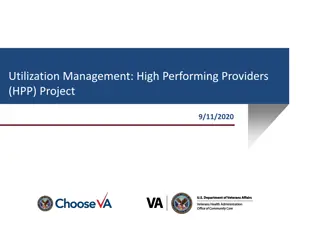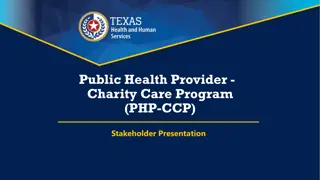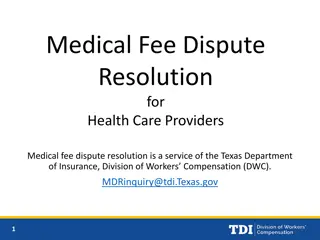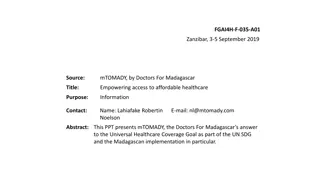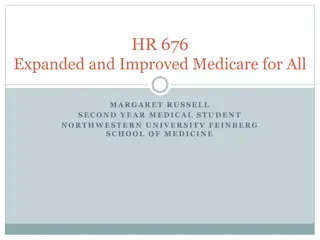Understanding EMTALA: Essential Information for Healthcare Providers
EMTALA (Emergency Medical Treatment and Active Labor Act) is a crucial regulation that mandates hospitals to provide emergency medical services to all patients regardless of their ability to pay. This act aims to prevent discrimination in emergency care and outlines requirements for medical screening, stabilizing care, on-call physicians, and patient transfers. Non-compliance with EMTALA can lead to serious consequences such as Medicare termination, fines, and civil liability. Learn about the history, enforcement, and implications of EMTALA to ensure proper compliance and patient care.
Download Presentation

Please find below an Image/Link to download the presentation.
The content on the website is provided AS IS for your information and personal use only. It may not be sold, licensed, or shared on other websites without obtaining consent from the author. Download presentation by click this link. If you encounter any issues during the download, it is possible that the publisher has removed the file from their server.
E N D
Presentation Transcript
EMTALA Lession 1: Introduction Lession 2: History and Enforcement Lesson 3; Medical Screening Lesson 4; Stabilizing Care Lesson 5: On-Call Physician Lesson 6: Appropriate Transfer
EMTALA Introduction EMTALA applies to all Medicare Hospitals with emergency departments. Under EMTALA, these hospitals must: Provide emergency medical screening to patients regardless of their ability to pay Stabilize patients with emergency medical conditions Transfer emergency patients only when medically appropriate Failure to follow the rules of EMTALA can lead to : Medicare termination Fines Civil liability
EMTALA Introduction After completing this course, you should be able to: List potential consequences of failing to comply with EMTALA Recognize key features of the medical screening exam (MSE) under EMTALA Identify key features of stabilizing care under EMTALA Describe the key features of an on-call system Cite key features of appropriate patient transfer under EMTALA
EMTALA History and Enforcement EMTALA is part of the Consolidated Omnibus Budget Reconciliation Act (COBRA) The purpose of EMTALA is to prevent discrimination in the treatment of patients with emergency medical conditions. Under EMTALA, all patients have the same rights to emergency care, regardless of ability to pay. The Centers for Medicare and Medicaid Services (CMS) review all EMTALA complaints and investigate if the complaint seems legitimate. If the EMTALA violation is proven, CMS informs the hospital of its two options: 1. The hospital must submit a plan of corrective action to CMS 2. The hospital will lose its status as a Medicare provider in 23 days
EMTALA History and Enforcement When a noncompliant hospital submits a plan of correction to the CMS, the hospital may be monitored for 90 days in order to ensure compliance with EMTALA. Hospitals pay a high price for EMTALA citations. Costs of citation may include: The required plan of correction Fines Civil Suits Reports to other agencies
EMTALA History and Enforcement CMS reports the results of all EMTALA investigations to the Office of the Inspector General (OIG). If the OIG can prove an EMTALA violation, it can impose fines. Fines are: Up to $50,000 per violation for hospitals with 100 beds or more Up to $25,000 per violation for hospitals with less than 100 beds Up to $50,000 per violation for individual physicians These fines are not covered by malpractice insurance.
EMTALA History and Enforcement EMTALA noncompliant hospitals may also be sued by: A patient harmed because of the hospital s violation A receiving hospital harmed financially because of a transfer from the violating hospital EMTALA violations can be reported to: The Justice Department to decide whether a violation of the Hill-Burton Act has occurred The Office of Civil Rights to decide whether discrimination has occurred The IRS to decide whether the hospital s tax-exempt status is in jeopardy DNV and result in additional surveys
EMTALA Medical Screening Exam (MSE) Under EMTALA, Medicare hospitals with emergency departments must screen patients who ask for emergency care. The purpose of the screening is to find out whether the patient has an emergency medical condition (EMC). An emergency patient may refuse to give consent for an MSE. If so, the hospital is not required to provide an MSE. The patient s refusal must be carefully documented in the medical record. Documentation should include the potential benefits of accepting services and the risks of refusal.
EMTALA Medical Screening Exam (MSE) Under EMTALA, Medicare hospitals must provide MSE to: All patients who come to a dedicated emergency department and request medical services All patients who come to any location on the hospital campus and within a 250 yard sphere, and ask for treatment for a possible emergency condition All patients who come to any location on the hospital campus and within a 250 yard sphere, and appear to have an emergency medical condition All patients transported to the hospital via an ambulance Patients must receive an MSE whether or not they are able to pay.
EMTALA Medical Screening Exam (MSE) Hospitals must not: Delay an MSE to collect financial information or present financial paperwork Refuse to provide an MSE because a patient s health plan will not authorize an MSE or to request pre-authorization before performing an MSE Convince a patient to leave before an MSE by discussing the cost of emergency services To comply with EMTALA, do not talk about payment until AFTER the patient has been screened and stabilized. All Medicare hospitals must post EMTALA signs: Must inform patients about their rights under EMTALA Should explain that an MSE will be provided regardless of ability to pay
EMTALA Medical Screening Exam (MSE) Triage is not an acceptable MSE under EMTALA. The MSE must be comprehensive enough to determine whether a patient has an emergency medical condition. In general, determining or excluding an emergency medical condition may require: A complete medical history Taking vital signs at regular intervals Performing a physical examination Performing any necessary lab or imaging studies
EMTALA Medical Screening Exam (MSE) The MSE must be able to rule out any possible physical cause for a psychiatric patient s symptoms. The MSE should look for trauma and medical disease. The MSE must be able to rule out any possible physical cause for an intoxicated patient s symptoms. The MSE should look for trauma, medical disease, side effects of medication or a psychiatric disorder.
EMTALA Medical Screening Exam (MSE) Physicians must be on-call to perform MSEs. However, EMTALA also allows non-physicians to perform MSEs. These non-physicians must be qualified medical personnel (QMP). If the hospital has QMP who perform MSEs: The QMP must have the authority to order any needed tests The MSE must be within the QMP s scope of practice under state law. The MSE must be part of the QMP s job description The QMP s personnel records must have documentation of MSE training, competencies, qualifications and quality review The hospital must have a written protocol authorizing QMP to perform MSEs and must describe when a physician should be called to back up a QMP Physicians who back up QMP must be on-call and respond promptly when called for backup
EMTALA Emergency Medical Condition (EMC) Under EMTALA, an EMC can be general or active labor. Under EMTALA, a patient has an EMC if the patient s symptoms are severe enough to: Seriously threaten the health and safety of the patient Cause serious harm to the patient s bodily function Cause serious harm to any bodily part or organ A pregnant woman has an EMS if she is having contractions (active labor) and: She is likely to deliver before she can be transferred safely to another facility Transfer could harm the woman or her unborn fetus
EMTALA Emergency Medical Condition (EMC) If a complete MSE does not find an EMC, the hospital has no further EMTALA obligation to the patient. However, if the MSE finds an EMC, the hospital must do one or both of the following; Stabilize the patient Transfer the patient to another facility if medically necessary
EMTALA Medically Stable Under EMTALA a Medicare hospital must provide stabilizing care to all patients with EMCs: As long as the hospital is able to provide the necessary care Using both on-duty staff and on-call staff as needed A women in active labor is stable only after she has delivered the baby and the placenta Patients with other EMCs are stable when the EMC has been corrected: Abnormal symptoms must be normalized through treatment or explained away as ongoing symptoms of a chronic condition
EMTALA Medically Stable Under EMTALA, a patient is NOT stable if: The patient s condition could worsen because of being transferred or discharged from the hospital. The patient s condition could worsen during or shortly following transfer or discharge from the hospital. There must be a reasonable risk that the patient s condition will worsen. Once a patient is stable, the hospital has no further duty to the patient.
EMTALA On-Call System Hospitals must have an on-call system Specialty physicians must be on-call to stabilize patients with EMCs. The on-call list must: Have the names of the specific physicians Must list each physician s on-call time and specialty All hospital specialties must be covered at all times The call list must be available to emergency department personnel. Call lists must be stored for 5 years
EMTALA On-Call System On-Call physicians must respond promptly when called and provide care at the hospital. An on-call physician is allowed to send a substitute such as a PA or APN. However: The physician must be the person listed as on call The physician must receive full information about the patient and then decide whether it is safe for a PA or APN to take the call If the physician decides to send a PA or APN, the clinician at the hospital must agree that this is a safe decision
EMTALA On-Call System EMTALA allows for certain potential conflicts with call: A physician may be on-call at more than one hospital at the same time A physician may schedule non-emergent appointments or surgery during on-call time However: Physicians must inform hospitals of potential conflicts Hospitals must have plans to mitigate potential conflicts Physicians must be prepared to leave non-emergent patients to respond to call Physicians must respond to call by going to the patient s current location
EMTALA On-Call System Many EMTALA investigations and citations happen when: On-call physicians do not respond to call A PA or APN responds to call for a specialty assessment when the on-call physician should have responded A PA or APN routinely responds to call for specialty assessments A patient must be transferred to another hospital because a physician does not respond to call The hospital has not developed protocols to address specialty needs when its under- represented specialists are not available to be on-call It is acceptable for a physician not to respond to call if the physician is already with a patient who cannot be left.
EMTALA Appropriate Transfer Under EMTALA, Medicare hospitals must: Provide medically appropriate transfers Accept requests for incoming transfers A transfer is not appropriate for financial reasons or physician/hospital convenience. Before a transfer can occur: The transferring hospital must provide medical treatment to make the transfer as safe as possible The receiving hospital must agree to the transfer and have personnel and space to meet the needs of the patient
EMTALA Appropriate Transfer Transfers must be certified or requested, Certified: The treating physician must certify that the expected benefits of transfer outweigh the risks and document the benefits and risks in the patient s medical record. Requested: The patient may request a transfer. The hospital must explain its EMTALA duty to provide stabilizing care and the potential risks of transfer to the patient. Transferring hospitals must send documentation to the receiving hospital: Patient s emergency medical record The physician s certification for transfer or the patient s request for transfer The transferring hospital must send the patient with all the necessary equipment and personnel.
EMTALA Appropriate Transfer Under EMTALA a Medicare hospital must accept a request for incoming transfer if the hospital has the necessary resources needed to treat the patient and the transferring hospital is less able to treat the patient. Hospitals are allowed to decline requests for incoming transfer under certain circumstances: The patient does not need the medical services of the hospital The hospital does not have space for the patient The transferring hospital is able to fully treat the patient CMS expects receiving hospitals to do everything possible to accept incoming transfers. After an appropriate transfer, the transferring hospital does not have any further EMTALA duty to the patient.









